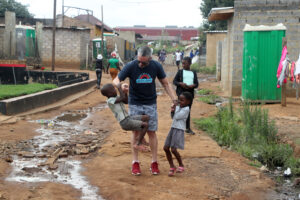Personal Story
The true essence of Soweto beyond the tourist attractions
I was looking for interesting things to do with my brother, Steven, who hadn’t spent much time in Johannesburg since emigrating with his family 21 years ago, when I heard of Ilan Ossendryver’s Tour Soweto company and visits to Kliptown. Steven wasn’t convinced initially, but we decided that it might be cool to visit the area where Nelson Mandela lived in Vilakazi Street.
Kliptown is the location where the Freedom Charter was adopted in June 1955. This historic moment was witnessed by various political organisations, trade unions, religious groups, and community associations. The document reflects the collective aspiration towards equality, justice, and democracy in South Africa.
Driving into Soweto, I grappled with anticipation and trepidation. As a white, female South African, the idea of a township tour made me uneasy. I’d heard stories about crime rates in townships, and was nervous to venture into these areas. I was also worried about how we would be perceived as white people visiting a predominantly black community.

However, any doubts I had soon dissipated as we were introduced to the residents of Kliptown. The first person we met was Thando, the local tour guide, who greeted us warmly. It was immediately apparent how much respect he had for Ilan, whom he affectionately referred to as a “nudnik”, a Yiddish term used to describe someone annoying.
Thando introduced us to two young gentlemen who asked if they could sing for us. It was their way of welcoming us to the area and earning a bit of money. Their songs included one which they’d written themselves, and then a rendition of Hevenu shalom aleichem, which translates to, “We have brought peace upon you”. Often sung as a part of Jewish rituals, the song expresses a desire for harmony, tranquillity, and goodwill towards others. We learned that their ability to harmonise was gleaned from Benjamin Zander, the world-renowned conductor who had visited Kliptown with Ilan a few years ago. Zander is a passionate advocate of classical music and a transformative approach to leadership and development through music.
The absence of the guitarist to accompany the singers was felt by everyone. We learned that he had been arrested over the weekend for taking the law into his own hands after he and two friends found the man who had raped his three-year-old daughter. It was a stark reminder of the harsh realities that plague the community.
After walking around for a short while, meeting some of the Mozambique locals in their fruit and veggie market and sampling their vetkoek, we crossed the railway bridge into Kliptown. The lack of drainage, running water, and toilets, as well as the fact that this is a township with no electricity, was evident. Dotted around the community were green porta loos, which Thando jokingly referred to as “ANC voting booths”. It’s clear that the ruling party has forgotten about this community, and the residents don’t have much faith in South Africa’s leadership.
The children of the township were the most welcoming. With outstretched arms, they offered hugs and tiny hands to hold. We visited the local crèche, where two classes of excited but well-behaved children sang for us, and showed us what they were learning.
Another memorable encounter was meeting four drummers, the youngest of whom was 10, who entertained us with their incredible skills and an eight-minute performance on their djembe drums. The four have entertained the congregations of Park and Oxford shuls at chaggim such as Lag Ba’Omer.
Our last meeting was with Bob, a gentle man whose eyes shone with the wisdom of a life lived fully. Bob lives with others in a large house, which he told us was the township’s “kibbutz”. As we shared stories, Bob told us of his transformative journey to Israel, where he had learned about keeping Shabbat, which had left an indelible imprint on him. Having never visited Israel ourselves, his stories offered a glimpse of a world where differences dissolved in shared traditions and sacred rituals.
As we said goodbye to the dusty streets of Kliptown, we felt a newfound sense of purpose and a deeper appreciation for the resilience of the human spirit.
On our way home, Ilan drove us through Vilakazi Street, past Nelson Mandela’s home. As much as the area boasts a rich legacy, including being home to two Nobel Peace Prize winners – Nelson Mandela and Archbishop Emeritus Desmond Tutu – we felt that the commercialisation detracted from its authenticity. But we were happy to have memories of Kliptown, where we discovered the essence and authentic moments of Soweto beyond the tourist attractions.
Do yourself a favour and spoil yourself to a day you’ll never forget.
- Kim Hatchuel is the proofreader at the SA Jewish Report.